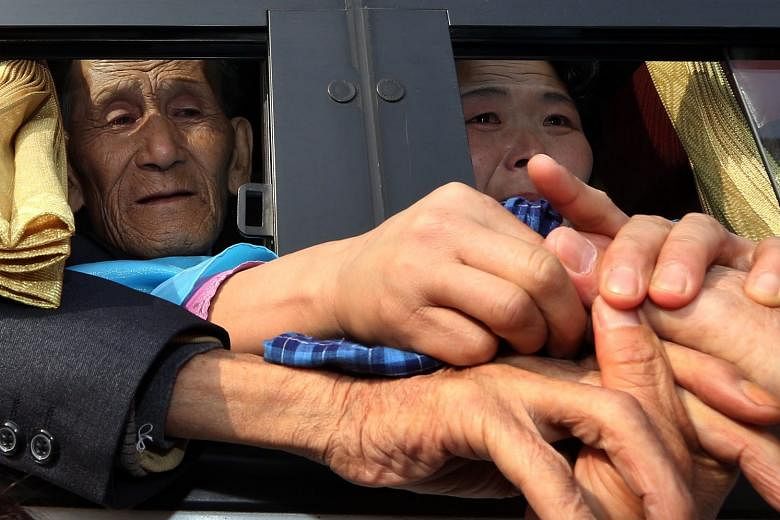SEOUL • There is a lot of sympathetic shouting going on at the call centre, with volunteers bellowing down phone lines at elderly people, checking their contact details and also verifying that they are still alive.
The callers struggle to work their way through tens of thousands of names, following the recent decision by North Korea and South Korea to organise a reunion for families separated by the 1950-53 Korean War. With logistics talks between the two rivals' Red Cross associations due to open today, the pressure is on to draw up a list of possible South Korean participants in the event - expected to take place early next month.
The emotional family reunion process began in earnest as an annual event in 2000. But strained cross-border relations have allowed only one in the past five years. For most of the South Koreans on the waiting list - many in their 80s and 90s - time is simply running out.
Of the nearly 130,000 people who have applied for a reunion spot since 1988, more than half have since died, and the mortality rate grows with every passing year. With just a few hundred names making the final cut for each event, only 3,668 people on the list have actually taken part in a reunion.
In the Red Cross call centre in Seoul, the volunteers are still working through the first stage - contacting the more than 66,000 names on the waiting list. The first priority is simply to check that they are still alive and, if so, willing and physically capable to take part in a reunion if among those finally chosen.
"It's a long, arduous task, contacting that many elderly people, one by one, double-checking their addresses, telephone numbers and other information," said Red Cross official Woo Kwang Ho.
It also kicks off an emotional roller coaster for those who receive the calls - raising their hopes of a meeting they have longed for but which, statistically, they are very unlikely to experience.
"We find there's a growing number of people who just don't want to know anymore. They're so frustrated," said Mr Woo. "And then there are many who are simply now too frail to consider participating. The reality is that this list will be nearly empty in a decade."
Being selected does not automatically mean a reunion spot. The North Korean side will have to check whether the relatives on the other side are still alive and willing to take part. The North has also cancelled reunions at the last minute because of some dispute or other.
Mr Kim Kyung Jae, 83, has waited for over 20 years to see the younger sister he left behind in the north-eastern town of Bukcheong. "My visual memories of my sister have dimmed a lot, but I'm still desperate to see her. That won't change until I'm in my coffin," he said.
For the lucky ones who do take part, the reunions are hugely emotional - almost traumatic - affairs, with many of the largely elderly participants breaking down and sobbing as they cling to each other. The events typically last several days and the joy of the reunion is tempered by the pain of the inevitable - and, this time, permanent - separation at the end.
"Many feel depressed afterwards because they can't maintain contact with relatives," said Mr Shim Coo Seob, who leads an association of separated families in Seoul. "It's time the government gave priority to securing an uninterrupted channel for the exchange of letters," he added.
AGENCE FRANCE-PRESSE

